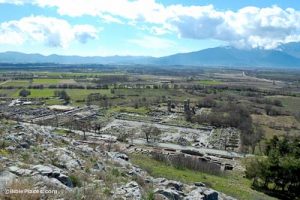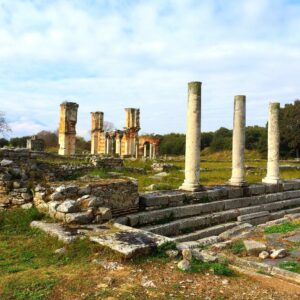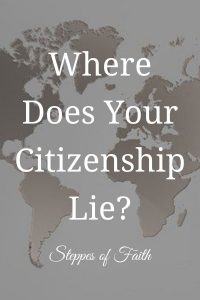
“For our citizenship is in heaven.” Philippians 3:20
Many times throughout history, one country has attacked and conquered another. Typically, the goal is to colonize the other country, dominate its citizens, and expand its influence. We’ve seen this with Great Britain, China, Spain, the United States, and others, including ancient empires like the Roman Empire. The Romans would take over a town and proclaim the people were now citizens of Rome, even though Rome was thousands of miles away, and no one in the town had ever seen it.
The idea of forced citizenship soon became a political issue, and it generated much resentment among the Jews. It is why they typically despised tax collectors. Those people were Jews, but they worked for the evil Romans, thus becoming traitors.
But the people of some towns didn’t mind it so much. They liked being Roman citizens. Such was the case in the colony of Philippi.
The apostle Paul was very much aware of the issue of citizenship, which is why he addresses it in his letter to the church in Philippi. Though citizenship isn’t the main thrust of his letter, the significance of his reminder to the church is still worthy of our remembrance today, so we never forget where our citizenship truly exists.
The Benefits of Roman Citizenship
The Greek town of Philippi (formerly called Krenides, meaning “Little Fountains” for the many nearby natural springs, and now called Filippoi), was named after Alexander the Great’s father, Philip II of Macedon. He conquered the area in the fourth century B.C. Two thousand years later, the town became an official part of the Roman province called Macedonia.
Following the Roman conquest of Philippi in 42 B.C., many of the army’s veterans settled in the town (now called a colony). Their widespread presence allowed for considerable benefits to all the citizens, which attracted even more people. These outsiders were not all originally Roman. Some had bought their citizenship by illegally bribing corrupt officials (Acts 22:28).
Regardless, the entire colony enjoyed special treatment.
The people operated autonomously from the provincial government, and they were granted Roman citizenship enjoying the same rights and exemption from certain taxes. Such advantages became such a great source of pride for the people they adopted Latin as their official language and many Roman customs.
The small population of Jews in Philippi did not enjoy living there, however. The memory of being brutally conquered by the Romans in Jerusalem was still very fresh in their minds though it occurred 500 years earlier.
Their long-held resentment was one reason why Paul felt compelled to write to the early church established there. He wanted to thank them for their kindness and loyalty, but he also wanted them to remember something very crucial.

Philippian Women
The Philippian church was the first one Paul founded in Europe during his second missionary journey (Acts 16:12-40). Because the colony’s Jewish population was so small, there were not enough men to form a synagogue. According to Jewish custom, at least ten men who are heads of households are required to create one. So, the Jewish women had to take charge.
With no synagogue, the women would gather outside the colony at a nearby river to hold prayer meetings, which is also Jewish custom (Acts 16:13). It was at these meetings where Paul preached to the women. He also met Lydia there. She was a wealthy, Christ-following merchant who you might recall sold expensive purple-dyed items. She was instrumental in setting up the early church in Philippi because she often invited the church’s members to meet in her home (Acts 16:14-15).
Knowing the church’s challenges in Philippi, especially being an overwhelming minority in the colony, Paul consistently tried to encourage the women’s faith. It wasn’t easy to be a Jewish Christian woman in a pagan Roman colony. Additionally, they always remembered how the Romans forced them to flee their homeland, then told years later they were now Romans, the enemy, and no longer Israelites. They were being stripped further of their identity.
Life was indeed challenging.
Knowing this, Paul included a special reminder in his letter, a reminder of where their true citizenship lays. We find this in Philippians 3:18.
“They are the enemies of the cross of Christ: whose end is destruction, whose god is their belly, and whose glory is in their shame—who set their mind on earthly things. For our citizenship is in heaven, from which we also eagerly wait for the Savior, the Lord Jesus Christ.”

True Citizenship
The Greek word for citizenship has several slightly different meanings. The word used here in verse 18 is politeuma (“pol-it-yoo-ma,” Strong’s #4175). It does not signify a person’s relationship to a governing state or nation. Here, citizenship means the condition of that person.
The King James Version uses the word conversation instead of citizenship, which indicates one’s attitude or behavior about something. In other words, they ought to focus their attitudes on heaven, not Rome.
The Lexham English Bible uses the word commonwealth instead of citizenship, indicating a community. As a commonwealth of the church, they ought to set their minds on heaven. Our community is in heaven, not Rome.
What Paul is trying to say is we are all pilgrims here on earth. We may live in places we don’t like or endure unpleasant circumstances, but it is essential to remember that our real community isn’t here on earth. Our home is in heaven.
And our attitudes should reflect that truth. Our conduct should be characteristic of our heavenly citizenship, as people worthy of the Gospel of Christ. Because if we set our attitudes on heavenly things, then we will not set our minds on earthly things (Philippians 3:19).
Roman citizenship was something to prize for many people. But Paul’s message is this: If Roman citizenship is so outstanding, how much more impressive is it to have our citizenship in heaven?

This is Not Our Home
The author of Hebrews also gave this reminder of heavenly citizenship to the Jews, using Abraham as an example.
“By faith, [Abraham] dwelt in the land of promise as in a foreign country…for he waited for the city which has foundations, whose builder and maker is God.” Hebrews 11:9-10
“These all [the patriarchs Abraham, Jacob, and Isaac] died in faith, not having received the promises, but having seen them afar off were assured of them, embraced them, and confessed that they were strangers and pilgrim on the earth. For those who say such things declare plainly that they seek a homeland. And truly if they had called to mind that country from which they had come out, they would have had opportunity to return. But now they desire a better, that is, a heavenly country. Therefore, God is not ashamed to be called their God, for He has prepared a city for them.” Hebrews 11:13-16
Those who are in Christ have their name written in His book. He promises them the gift of eternal life spent with Him. Until that day comes, we are to be about our Father’s work. We are to share the Good News and expand the kingdom of God here on earth.
“For we are His workmanship, created in Christ Jesus for good works, which God prepared beforehand that we should walk in them.” Ephesians 2:10.
We are here to do a job, to fulfill a purpose God has for us. Earth is merely our place of business, but our home is in heaven. God has prepared a much better place, a heavenly city for us, a house with many rooms (John 14:3). And Jesus has already made the way possible with His atoning death and resurrection. With this in mind, we can better endure difficult situations.
“Therefore, my beloved and longed-for brethren, my joy and crown, so stand fast in the Lord.” Philippians 4:1
